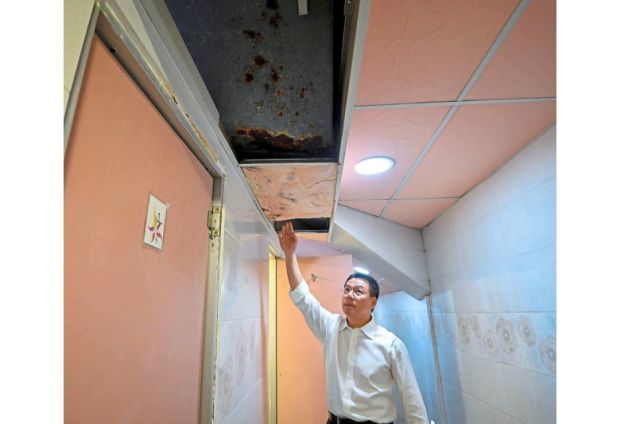
On a mission: Nga hopes to flush out dirty and out of order public toilets. —Facebook
… but somebody’s gotta do it. Malaysians must make sure that our kids are taught the importance of cleanliness from young.
STAND-UP comedian Marissa Wong is known for her jokes on the state of Malaysian toilets. In fact, she’s probably the only one who reviews toilets and shares her findings on social media. Believe it or not, at last count, she has conducted over 100 inspections.
Some find her toilet jokes off colour, but they hit the spot for most of us. The truth sometimes hurts, and in this case, it’s really no laughing matter. Unfortunately, we have many bad public toilets and equally bad personal practices.
Newly-minted Local Government Development Minister Nga Kor Ming appears to have endeavoured to push for clean public toilets and has even conducted checks on these basic amenities. It’s hard to ignore it seeming like a personal crusade.
His first stop was Dataran Merdeka, soon after clocking out from his office on Jan 3.
The Teluk Intan MP deserves praise for his efforts, but we hope he has the stamina, determination and drive to persevere through his campaign.
It looks daunting because he will need the support of the local authorities, which comes under his purview. Those of us who’ve dealt with powerful bodies will know how difficult it is to move them.
There are more than 200,000 public toilets under the jurisdiction of the local authorities.
This initiative could be dead in the water should the Malaysian public not have good practices. Nga could be taking on Mission: Impossible.
For success story references, we don’t need to look too far. The toilets in Taiwan and, naturally, Japan, are always clean and dry. The amenities work perfectly, and cleaners take pride in their jobs.
It wouldn’t be fair to merely pin the blame on local authorities because many of our restaurants and coffee shops have filthy toilets, too.
For reasons only known to these outlet owners, many don’t have toilet rolls either. Disturbingly, sometimes, toilet rolls are placed on tables in some eateries to be used as serviettes. It looks like these food operators can’t tell the difference between them.
Airports, railway and bus stations would probably come under a different jurisdiction, and these are also gateways for tourists.
We wish Nga the best for his noble plan, but he isn’t the first to harbour this desire.
The DAP national vice-chairman is right to say that the cleanliness of public toilets is closely related to the image of Malaysia, especially at prime tourist destinations or gateways to our country.
“Doubtlessly, ‘BMW’ standard public toilets, namely Bersih (clean), Menawan (attractive) and Wangi (fragrant), will go a long way to increase the positive perception of the people towards the local authorities.”
Nga hopes that all the 155 local authorities across the country can establish public toilet hygiene monitoring units to conduct scheduled maintenance work to ensure that public toilets nationwide are always in a clean, well-functioning and orderly condition.
In the early 2000s, the late Deputy Housing and Local Government Minister Datuk Robert Lau Hoi Chew had the same intentions. He was even nicknamed Malaysia’s “toilet king” and until he became Deputy Transport Minister in 2004, his tireless effort for clean public toilets was described as “unfinished business”, in his own words to the media.
Lau, who was the MP for Sibu, is best remembered for setting up the first toilet association in Malaysia – Quality Restroom Association Malaysia (QRAM) – of which he was chairman since its inception in 2005.
Nga has said he would meet Kuala Lumpur mayor Datuk Seri Mahadi Che Ngah, saying he is committed to finding the best solution so that infrastructure or public facilities built with the people’s money can be looked after and maintained properly.
But he might want to seek support from the Education Ministry too because, ultimately, the education process starts with students in schools.
School toilets are atrocious, so students must be taught from an early age about the importance of cleanliness to instil proper habits. In fact, it should even begin at the kindergarten stage.
That’s how Japanese kids are taught – to be orderly, queue up, and make sure to put your eating trays in the designated spots once you’re done with your meals.
It’s imperative to align with the respective religious bodies because cleanliness is a vital component among all religions.
There’s also no reason why our toilets must always be wet – stop at any rest and recreation area along the highways and the toilets always seem to be wet.
YB, since housing is also under your jurisdiction, Malaysians have often wondered why our toilet faucets have no handles or levers. It should really be compulsory for all developments.
We hope his efforts will put a shine on our water closets, otherwise everything will just get flushed down the toilet.





